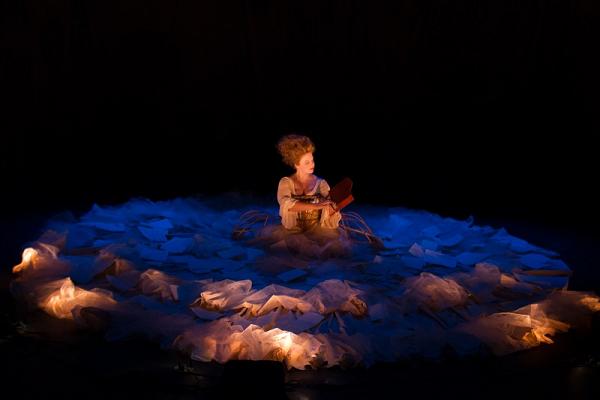
We happened to attend the play on the 187th anniversary of Maria Anna Mozart's death on October 29, 1829. Exactly five days short of 100 years later, Virginia Woolf published her seminal A Room of One's Own, in which she mused on "what would have happened had Shakespeare had a wonderfully gifted sister" who was also interested in the theater (spoiler: she ends up a pregnant runaway and suicide). On the one hand, Maria Anna does not meet quite so tragic an end, but, on the other hand, her life story is not hypothetical. The play begins with its own kind of "what if?" before pivoting to a narrative drawn in large part from a trove of family letters -- Wolfgang's and her father's, for the most part; like her compositions, her letters have not survived. Within the play, from the time of her early childhood, Nannerl's brother is afforded more leniency and more freedom: Wolfgang is permitted to begin to play instruments earlier, to play more of them, and to play them more flashily. For a woman to play violin (or other orchestral instruments) or to show off in public the same "tricks" on the harpsichord or fortepiano would have been an impropriety. Despite this, the siblings tour together internationally, but this ends once Maria Anna reaches a marriageable age, and she is left behind while Wolfgang continues to tour. When, at a much later point, the family is reunited in Munich by one of Wolfgang's commissions, the siblings play together in private once again, but only the brother performs in public. Of course, these gender-based dichotomies are not confined to music: while her brother marries without permission, disrupting their father's plan for him to support the family, Nannerl ends up marrying not the man whom she prefers but a decidedly un-musical provincial baron with five children from his two deceased wives. Although she does tell us of a renewed interest in her playing by her father before his death, and she eventually teaches music lessons for pay, she remains subsumed by her more famous brother until the end, becoming the preservationist and executrix of his legacy and identified even on her gravestone by the status of "sister."
The demanding role of Maria Anna is played by four performers in rotation: creator Sylvia Milo, Samantha Hoefner, Daniela Galli, and, on the night that we attended, Jody Christopherson. Christopherson admirably juggles, with humor and pathos, various voices, accents, and moods as she spins an intercontinental lifetime out of only her speech, movements (aided by period-appropriate direction from Janice Orlandi), a few small props, and a striking 18-foot dress that covers the stage area and that the actor performs on and, ultimately, in -- all within a space small enough to smell the dusting powder that she at one point sets airborne. The play highlights the injustices of a historical moment when a woman's musical talent (talent, not genius, our storyteller emphasizes) was seen as mere personal ornamentation with almost startlingly misogynistic quotes from Kant and Rousseau, but it also provides contrasts through the symbolism of Saint Cecilia, patron saint of musicians, and her organ, as well as through the real-life example of Marianna Martines, an Austrian noblewoman who was fortunate (i.e., wealthy) enough to live the kind of life normally reserved for male performers and composers, including never marrying. The expansive dress itself is an important symbol -- it is an adornment, but also a cage, and it bears in its diaphanous folds all the weight of her personal history, of the various letters and what they represent.
At one point in the performance, Wolfgang Mozart's music steadily increases in volume until it (almost) drowns out Nannerl. This has, for the most part, been the case historically as well -- after the play, we met up with two humanities professors, neither of whom was aware of her -- but The Other Mozart is making sure that her voice is heard once again. - Leah Richard and John Ziegler
